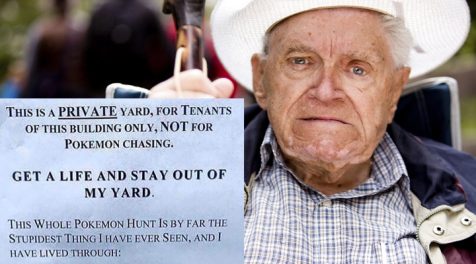Grumpy Exam Reader
I participated in reading (grading) the GPE, nee WPE, exam @CSULB today. (GPE = Graduate writing Placement Exam, WPE = Writing Proficiency Exam) Which means it’s another occasion to think critically about this aspect of our academic degree journey.
On past GPE reading days I’ve talked about:
- Is Critical Thinking Dead? (can Donald Trump pass the Turing Test?)
- The Writing Proficiency Exam is a Giant Milgram Experiment
My collected thoughts on the GPE / WPE are here:
Today during the reading one of my colleagues offered an insight that was consistent with my previous thinking, but he seemed to cut even more succinctly to the core of it:
most GPE prompts are written from a “grumpy old man” perspective: that things were better in some past time and that the student is now invited to agree that this or that aspect of their culture is better or worse than the past.
Context
Maybe even better than my past arguments, this colleague seemed to explain why every time I read these things I long to hear a student state, I reject the premise of this prompt. But as I’ve argued before, this is in many ways a conformity exam, and students understand that they are not rewarded for taking a strong ideological stand or advancing a unique vision. I think most of them believe that they are rewarded – given another merit badge on their way to their US$26,080 piece of paper (diploma) – for providing the answer that the question seems to suggest that they write.
To a fair degree this is a structural exam. But the university cannot privilege form over content.
Can it?
To badly paraphrase Dr. King, form is the color of your skin, ideas are the content of your character. I dream of a GPE that encourages students to articulate the biggest ideas they believe in.
Free Speech?
For me the Obama Administration’s biggest failure is it’s failure to live up to Candidate Obama’s promise to defend whistle blowers. Instead at this administration’s hands: Chelsea Manning in prison for longer than Nelson Mandela. Edward Snowden finding asylum in Vladimir Putin’s Moscow. And Aaron Swartz dead. It is clear that this administration does not respect Internet freedom. This administration may call for Civil Rights on the ground, but it does not respect Civil Rights in Cyberspace.
I have come to appreciate that censorship is not about the 1 book you ban. Nor about China incarcerating Ai Weiwei. It is about the thousand authors, about the thousand artists, who self-censor in these climates of fear. Manning, Snowden, and Swartz all suffered because the Obama Administration was more concerned about it’s authority than about advancing, openness, government transparency, accountability, and freedom of speech.
I have come to appreciate that nothing is more fragile than speech. To say We respect free speech or we believe in free speech, isn’t nearly enough. Speech is a fragile, essential part of our cultural lives and it must be more that protected, it must be encouraged.
Conformity
When I read GPE exams that, even subtly, suggest conformity instead of innovative thinking, I am watching this university ever-so-subtly crush the impulse toward free speech. I am watching this university ever-so-subtly tell students to tell us what we want to hear.
Brutal Honesty
After 11 years of teaching face-to-face, and 4 summers of teaching online, this semester is my first teaching hybrid. I was disappointed to look at my YouTube analytics and see all the students “leaving the room” as the minutes of my video ticked along.
It was only after sharing my YouTube analytics with Terre Allen of the CSULB Faculty Center for Professional Development (FCPD) that I made peace with my somewhat disappointing analytics. Allen argued that the YouTube Analytics were only the brutally honest version of what is less visible in the F2F classroom:
- Not everybody comes to class
- Some people sleep
- Some are awake but daydreaming
- Text, Snapchat, Instagram, Facebook
- And even those who manage to pay attention lose that attention every few minutes.
So the stream of departing YouTube viewers, while not great, is a very overt stating of what is harder to see, but still present, in the F2F classroom. F2F it’s a big statement to walk out in the middle of a class. On YouTube you just leave the moment you lose interest.
Brutal honesty.
The Truth we don’t want to hear
When our students do “speak” candidly, we may not always like what we hear. But we can come to understand them. When we prompt them to provide a suggested critique, they will tell us what we want to hear. We will be reassured. But falsely. They will have learned one more small lesson in their lifetime journey of conformity.
As if anticipating all of this, one of the last papers I read today argued that the prompt for this essay might indeed be the perspective of old people, but that it isn’t the reality of the young. That rather than “A or B”, the question should have been
How do we build a better future?


Comments? Questions? What great art did you see, make, or experience today?